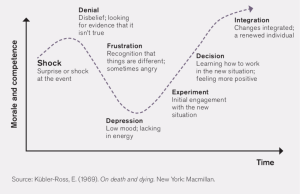
Change and Seasonal Wellbeing
Change is a natural part of life, yet it often feels anything but easy. Examples of change could be a relationship ending, starting a new job, moving home, experiencing loss, or even positive milestones such as becoming a parent—change brings uncertainty. Many people find themselves searching for support during these times, and counselling for life transitions can provide exactly that (Neimeyer, 2012).
🍂 As the seasons shift into autumn and winter, the days get shorter, natural light fades, and for many, energy and mood can also dip. This seasonal change can feel like yet another layer of uncertainty or challenge during life transitions and is sometimes referred to as Seasonal Affective Disorder (SAD) (Magnusson, 2000).
Why Change Feels Overwhelming
Our minds and bodies are wired for familiarity. When the familiar shifts, whether due to life events or seasonal changes, we may experience:
- Anxiety — worrying about what the future will bring (Lazarus & Folkman, 1984).
- Stress — feeling unsettled or unable to cope with the unknown (American Psychological Association, 2023).
- Grief and loss — mourning the old chapter, even when the new one seems exciting (Worden, 2018).
- Resistance — a natural pushback against stepping outside our comfort zone (Prochaska & Norcross, 2018).
Feeling unsettled doesn’t mean you’re failing to cope; it means you’re human.
Understanding Change Through the Kübler-Ross Curve
A helpful way to understand the emotional journey of change is through the Kübler-Ross model, originally developed to describe the stages of grief (Kübler-Ross & Kessler, 2005). These five stages: denial, anger, bargaining, depression, and acceptance, can also reflect how people experience major life transitions, including adjustments to seasonal shifts and changes in daily routines.

- Denial – Feeling shock or disbelief: “This isn’t happening to me,” or “I can’t handle this change.”
- Anger – Frustration or resentment at the situation or oneself: “Why is this happening?”
- Bargaining – Seeking ways to regain control: “If I do X, maybe things will go back to how they were.”
- Depression / Sadness – Mourning the old chapter and feeling loss, uncertainty, or overwhelm. Shorter days may intensify these feelings for some (Lewy et al., 2006).
- Acceptance – Coming to terms with the change, adapting, and beginning to envision growth.
Progress through these stages is rarely linear; people may move back and forth, experience several stages at once, or skip some entirely (Kübler-Ross & Kessler, 2005). Recognising this can normalise the emotional ups and downs of change.
Small Steps to Support Wellbeing During Change
Counselling can provide a safe and supportive space to explore these emotions and navigate the stages of the Kübler-Ross curve. Alongside counselling, small everyday steps can also help you manage uncertainty and low mood, particularly during seasonal shifts:
- 🌞 Seek the light – spend time outdoors in natural daylight, especially in the morning, which can help regulate mood and circadian rhythms (Lewy et al., 2006).
- 💡 Brighten your space – keep curtains open, use mirrors, or consider a light therapy lamp.
- 🏃 Move your body – even short walks or gentle exercise can boost mood and energy (Craft & Perna, 2004).
- 🧑🤝🧑 Stay connected – reach out and share how you’re feeling with others (Cohen & Wills, 1985).
- 🛏️ Prioritise rest – aim for consistent sleep and a gentle bedtime routine.
- 🎨 Nourish your mind – reading, journaling, or creative activity can lift spirits.
These steps, combined with counselling, help you approach both life transitions and seasonal challenges with resilience, self-compassion, and clarity.
Finding Growth in Transition
Many people discover that counselling during change leads to:
- Greater self-awareness.
- Stronger confidence and coping skills.
- A renewed sense of direction and purpose (Prochaska & Norcross, 2018).
What begins as a challenge:, can become an opportunity for growth, healing, and personal transformation.
Moving Forward
If you are struggling with a life change or feeling low during seasonal transitions, you don’t have to face it alone. Counselling can support you in processing emotions, navigating uncertainty, and finding hope in new beginnings, helping you move through each stage of change with understanding and care.
References
American Psychological Association. (2023) Stress: Coping with everyday problems. APA. Available at: https://www.apa.org/topics/stress (Accessed: 27 September 2025).
Cohen, S. and Wills, T.A. (1985) ‘Stress, social support, and the buffering hypothesis’, Psychological Bulletin, 98(2), pp. 310–357.
Craft, L.L. and Perna, F.M. (2004) ‘The benefits of exercise for the clinically depressed’, Primary Care Companion to The Journal of Clinical Psychiatry, 6(3), pp. 104–111.
Kübler-Ross, E. (1969). On death and dying. New York: Macmillan.
Kübler-Ross, E. and Kessler, D. (2005) On Grief and Grieving: Finding the Meaning of Grief Through the Five Stages of Loss. New York: Scribner.
Lazarus, R.S. and Folkman, S. (1984) Stress, Appraisal, and Coping. New York: Springer.
Lewy, A.J., Lefler, B.J., Emens, J.S. and Bauer, V.K. (2006) ‘The circadian basis of winter depression’, PNAS, 103(19), pp. 7414–7419.
Magnusson, A. (2000) ‘An overview of epidemiological studies on seasonal affective disorder’, Acta Psychiatrica Scandinavica, 101(3), pp. 176–184.
Neimeyer, R.A. (2012) Techniques of Grief Therapy: Assessment and Intervention. New York: Routledge.
Prochaska, J.O. and Norcross, J.C. (2018) Systems of Psychotherapy: A Transtheoretical Analysis. 9th edn. Oxford: Oxford University Press.
Worden, J.W. (2018) Grief Counseling and Grief Therapy: A Handbook for the Mental Health Practitioner. 5th edn. New York: Springer.
